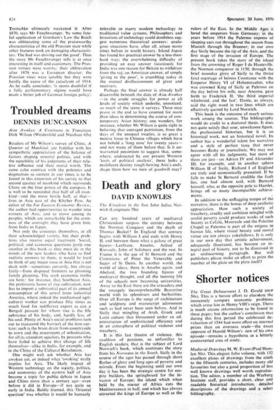Troubled dreams
DENNIS DUNCANSON
Asia Awakes: A Continent in Transition Dick Wilson (Weidenfeld and Nicolson 65s)
Readers of Mr Wilson's survey of China, A Quarter of Mankind, are familiar with his sympathetic appreciation of the balance of factors shaping oriental politics, and with the equability of his judgments of their rela- tive influence and their moral worth. The same calm contrast with the polemics and dogmatism so current in our times is to be found in this extension of his survey to that second quarter of mankind which surrounds China on the four points of the compass. It is well to be reminded that half of all man- kind—and the more fertile half, at that— lives in Asia east of the Khyber Pass. As editor of the Far Eastern Economic Review, the author had opportunities to wander into corners of Asia, and to move among its peoples, which are remarkable for the even- ness of the oversight they have given him, from India to Japan.
Not only the countries themselves, in all their acknowledged variety, but their prob- lems also receive equal treatment. Social, political, and economic questions jostle one another in this book as they must do in the minds of the new leaders who have to find realistic answers to them; it would be hard to think of any major issue in Asia that is not dealt with—sometimes cursorily, but always fairly—from disputed frontiers to planning family planning. The stark economic truths are here: for instance, that Southeast Asia, the prehistoric home of rice cultivation, now has to import a substantial part of its annual consumption of this cereal from industrial America, where indeed the mechanised agri- cultural worker can produce fifty times as much food for indifferent export as can a Bengali peasant for whom rice is the life substance of his body, and, hardly less, of his soul. Plenty of Asia's social problems turn out to transcend the barrier's of the iron cur- tain; such is the brain drain from countryside to town and the resentment of urbanisation, for all its attendant squalors, by peasants who have failed to achieve that change of life themselves—alike in India, for example, and in the China of the Cultural Revolution..
One might well ask whether Asia has awoken yet, or indeed what 'awaking' really implies for Asia. The likely impact of Western technology on the sqpiety, politics, and economics of the eastern half of Asia became a topic for public debate in Japan and China more than a century ago—even before it did in Europe—if not quite so early in India. Baldly framed, this 'Oriental question' was whether it would be humanly tolerable to marry modern technology to traditional value systems. Philosophers and historians of technology could doubtless sug- gest numerous theoretical answers: analo- gous situations have, after all, arisen many times before in world history. Island Japan has found her practical answer by a less-than- hard way; the overwhelming difficulty of providing an easy answer vicariously for India was one reason for Britain to with-draw from the raj; an American answer, of simply `giving to the poor', is crumbling today in the mutual disillusionment of giver and receivers.
Perhaps the final answer is already half discernible beneath the data of Asia Awakes —in the crude struggles for power at all levels of society which underlie, unnoticed, so much of the scene it surveys. These may prove in the end to have counted for more than ideas in determining the course of con- temporary Asian history; one wonders, for instance, whether Mr Wilson is quite right in believing that outraged patriotism, from the days of the unequal treaties, is so great a motive force in Chinese villages which have not beheld a 'long nose' for twenty years— and not many of them before that. Is it un- warranted pessimism to suggest that, some- where, undetected by our present Western 'tools of political analysis', there lurks a maleficent destiny rough-hewing Asia's ends, shape them how we men of goodwill may?


































 Previous page
Previous page